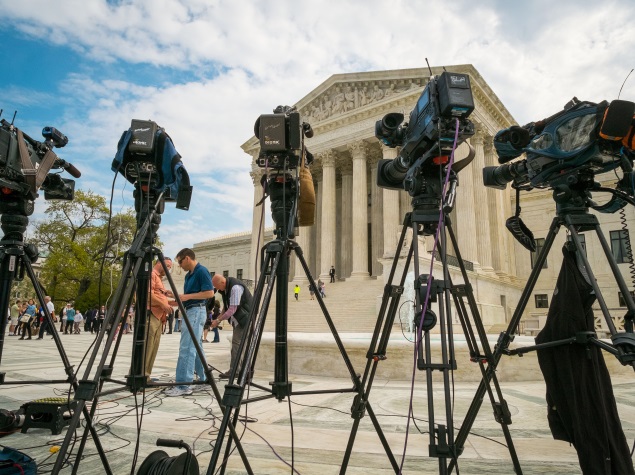- Home
- Internet
- Internet Features
- What the US Supreme Court Ruling Means for Aereo
What the US Supreme Court Ruling Means for Aereo

The Supreme Court dealt Internet startup Aereo a major setback on Wednesday in ruling that the television-over-the-Internet service operates much like a cable TV company. As a result, the service violates copyright law unless Aereo pays broadcasters licensing fees for offering TV stations to customers' tablets, phones and other gadgets.
Aereo was still operating Wednesday afternoon without paying such fees, as the U.S. District Court in New York must still implement the Supreme Court's findings. But Aereo's options are limited. The ruling may also affect other Internet services, though the Supreme Court did try to limit the scope of its decision.
Here's a closer look at the ruling and what it means for Aereo and Internet users.
Q: What does the ruling say?
A: Aereo streams television shows to customers in New York and 10 other markets. It has claimed that the service is legal because each customer is temporarily assigned an individual antenna about the size of a dime, so it's akin to customers putting up their own antennas on rooftops. By contrast, cable systems typically have one antenna serving thousands of customers in an area.
The Supreme Court rejected Aereo's argument, saying that it acts like a cable system. Aereo's use of individual antennas, the court says, "does not make a critical difference." As a cable system, the court says, Aereo must pay the same retransmission fees that broadcasters demand from cable and satellite TV providers.
Q: Why is Aereo still operating?
A: Although the Supreme Court expressed its thinking on the law, it's the lower court that must issue a preliminary injunction stopping the service, as requested by broadcasters. That could take a few weeks. It's not guaranteed that the lower court will halt Aereo's operations, but it's very likely.
Once an injunction is issued, broadcasters must prove copyright infringement during a trial. Because it's now likely that broadcasters will ultimately prevail, Aereo might simply decide to shut down. Even then, broadcasters might still decide to pursue the case and seek damages, possibly as a message to future entrepreneurs contemplating video services that don't involve licenses.
Q: What's the big deal? Couldn't Aereo simply pay the licensing fees and continue to operate?
A: Yes, although broadcasters and Aereo would have to negotiate the amount. Disputes over fees have frequently resulted in channels temporarily disappearing from various cable and satellite lineups. Broadcasters aren't likely to offer Aereo friendly terms, especially if doing so would alienate the cable and satellite providers from which broadcasters already generate much more revenue.
It's also not clear whether Aereo can really afford it. Aereo's service starts at $8 a month, which is much cheaper than cable. The company spends much of that on equipment such as antennas and computers, along with leasing indoor and outdoor space to house all that. If Aereo starts paying fees to broadcasters, monthly subscription rates would likely have to go up significantly- the way cable bills have steadily increased over the years.
Q: What will Aereo do?
A: In a statement, Aereo CEO Chet Kanojia vowed to "continue to fight for our consumers and fight to create innovative technologies." However, he didn't offer specifics. The statement also said nothing about how long Aereo plans to keep operating and whether it will offer refunds if it shuts down.
In a spring interview with The Associated Press, Kanojia insisted the company had no backup plan, but had assets it could sell off, such as the technology powering the service.
Q: What does this mean for other Internet video services?
A: Licensed video services such as Netflix and Hulu won't be affected at all. This case is about content that hasn't been licensed, and it might discourage future entrepreneurs from experimenting with unlicensed services, even if they are ultimately legal under fair use or other aspects of copyright law.
"Anyone who wants some degree of certainty about the legality of the business needs to make sure content holders get paid, not just in broadcasting, but in other areas of the marketplace as well," says Bruce Ewing, an intellectual property lawyer at Dorsey & Whitney.
There might be cases where unlicensed content is legal, he says, but "who's going to invest money in this?"
Q: What about other Internet-based services, such as Dropbox, Google Drive and others that let you store content online?
A: Aereo and its supporters had warned that a ruling against Aereo could kill other Internet-based storage services because, like Aereo, they store digital copies of content and deliver it to customers on request.
The Supreme Court tried to limit the scope of its ruling by saying that context matters. For instance, it isn't necessarily illegal for a service to store content that the customer actually owns, which is the case with many Internet storage services. And if distribution is limited to just relatives and a small social circle, that likely doesn't count as a public performance that violates copyright law.
"Trouble is, any time the Supreme Court acts, its actions have effects and implications that extend well beyond the case," says Harry Cole, a communications regulations lawyer at Fletcher, Heald & Hildreth. "No matter what the justices say, lawyers read these cases and try to figure out what exactly is being said."
In other words, the Supreme Court offered some guidance but left a lot open for future lawsuits.Catch the latest from the Consumer Electronics Show on Gadgets 360, at our CES 2026 hub.
Related Stories
- Samsung Galaxy Unpacked 2025
- ChatGPT
- Redmi Note 14 Pro+
- iPhone 16
- Apple Vision Pro
- Oneplus 12
- OnePlus Nord CE 3 Lite 5G
- iPhone 13
- Xiaomi 14 Pro
- Oppo Find N3
- Tecno Spark Go (2023)
- Realme V30
- Best Phones Under 25000
- Samsung Galaxy S24 Series
- Cryptocurrency
- iQoo 12
- Samsung Galaxy S24 Ultra
- Giottus
- Samsung Galaxy Z Flip 5
- Apple 'Scary Fast'
- Housefull 5
- GoPro Hero 12 Black Review
- Invincible Season 2
- JioGlass
- HD Ready TV
- Laptop Under 50000
- Smartwatch Under 10000
- Latest Mobile Phones
- Compare Phones
- Vivo Y500i
- OnePlus Turbo 6V
- OnePlus Turbo 6
- Itel Zeno 20 Max
- OPPO Reno 15 Pro Mini 5G
- Poco M8 Pro 5G
- Motorola Signature
- Vivo Y50e 5G
- Lenovo Yoga Slim 7x (2025)
- Lenovo Yoga Slim 7a
- Realme Pad 3
- OPPO Pad Air 5
- Xiaomi Watch 5
- Huawei Watch 10th Anniversary Edition
- Acerpure Nitro Z Series 100-inch QLED TV
- Samsung 43 Inch LED Ultra HD (4K) Smart TV (UA43UE81AFULXL)
- Asus ROG Ally
- Nintendo Switch Lite
- Haier 1.6 Ton 5 Star Inverter Split AC (HSU19G-MZAID5BN-INV)
- Haier 1.6 Ton 5 Star Inverter Split AC (HSU19G-MZAIM5BN-INV)

















